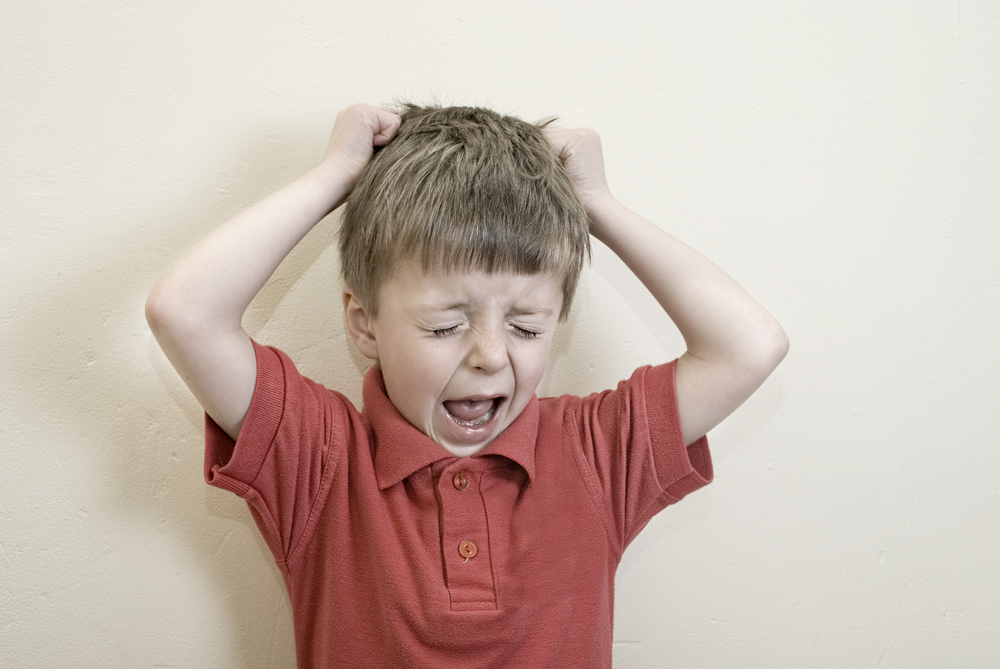Parents Rank 'Judgment' as a Big Problem in Raising a Child with Autism

When Selena Barclay took her three sons to watch the Fourth of July fireworks in their small Missouri town last week, her son Logan quickly became upset by the noise and crowd. Feeling agitated and anxious, Logan sought comfort in his mother's arms and pulled her hands to cover his ears.
But the sight of Logan, a tall 13-year-old, sitting cradled on his mother's lap, drew disapproving looks and stares from people sitting around them. Logan has an autism spectrum disorder, and Barclay said she is accustomed to such treatment.
"Other parents look at you, like, 'Oh my gosh, what is going on there?'" said Barclay, a 31-year-old medical assistant.
During trips to the grocery store, Logan will scream, curse and sometimes have a full-fledged tantrum, Barclay said.
"People will stare, or they will just completely, not even look at you, and walk away," Barclay said. She's felt judged and ostracized, she said. "Most people think that you just need to discipline your child more."
A new study finds that Barclay's experiences are common among parents of children with autism. Researchers in England interviewed parents about the biggest challenges they face in their daily lives.
Among the problems that parents identified, dealing with judgments from other adults ranked second only to dealing with their child's behavioral problems. The financial burden of autism — including medical treatments or specialized child care — and the emotional impact that it can have on a family, were rated by fewer parents as a problem, the study found.
Get the world’s most fascinating discoveries delivered straight to your inbox.
"Autism is a condition which is difficult for many to understand," said study researcher Amanda Ludlow, a lecturer in psychology at the University of Birmingham. One reason is the great variation in the characteristics of people with autism — some children with an autism spectrum disorder barely speak, while others have an extensive vocabulary, but are extremely literal in their language, she said.
Dealing with judgment
About one in 88 children in the U.S. is diagnosed with an autism spectrum disorder, according to the Centers for Disease Control and Prevention.
The challenges that parents of children with autism face aren't well-studied, so Ludlow and her colleagues interviewed 20 parents whose children have an autism disorder. One recurring theme that emerged was that parents felt judged by other adults when their children acted out.
"People question your parenting skills," Barclay said. Children often have no outward signs of their autism, and looking completely normal opens them up for judgment in a way that children with more obvious disabilities are not judged, she said.
Barclay said she lost touch with her group of high school friends, who all had children around the same time, when her son began acting differently than the others.
"Logan had been developing normally, and he was potty trained, then he regressed," Barclay said. "He started acting weird — he went to the bathroom in his pants, stopped talking as much and made up his own language. He would hit and bite kids. After a while, those invites and phone calls started dwindling."
Ludlow said that some parents in the study also mentioned a lack of understanding from their own parents or in-laws. There appeared to be a generation gap: people who weren't aware of autism as a medical condition for most of their adult lives assumed children's behavior came down to parenting, and they would outgrow it if disciplined, she said. She noted that her study, published this month in the Journal of Health Psychology, was small, and that not all parents' experiences are the same.
Indeed, Barclay said when she introduced Logan to the parents of her husband (who is not Logan's father), her father-in-law said, "that child needs a spanking." Logan and his stepgrandfather have since become very close, she said, but it took about six months for him to gain an understanding of Logan's condition.
What can be done?
The best thing people can do if they see a child acting out is to offer to help the parent, Barclay said. She recalled feeling enormously grateful to a neighbor who, upon seeing Logan have a tantrum at Barclay's home, packed up backpacks for her two other sons and took them to her home for the evening.
Even strangers in the grocery store can help, she said, for example, by offering to tell a store manager about items have been broken in the course of a tantrum, or keeping an eye on other children while a parent focuses on dealing with their autistic child, she said.
Public outbursts also provide an excellent opportunity for parents to talk to their own children about children with autism, she said. "They can stop their kids from bullying by explaining to their children what's going on. Kids can be mean, but if you explain to them what's happening, when they see that behavior on their own, they won't think it's so weird."
Lisa Goring, the vice president of family services at the charity Autism Speaks, said she once helped a grandmother in the grocery store with her autistic grandson by offering to wait in the cashier's line and purchase the groceries (with the grandmother's money), giving the woman a chance to take the boy outside for a cool-down period.
"It's really important for families who encounter such behavior not to judge. Give a knowing smile, convey that it's ok," Goring said. Parents hosting children in their homes can offer a child a quiet room where they can take a break from the crowd, if they need it. Children can be instructed to make sure they extend invitations to those with autism, but not pressure them to accept the invitation, she said.
With greater awareness of autism, Goring said, the tide has been turning, and judgment may be becoming less common. Recently, she assisted in making a reality show in which a child actor behaved distraught in a restaurant, much as a child with autism would act, and a hidden camera captured bystanders' reactions.
To her surprise, she said, most people were understanding, and even spoke up to shush an "antagonist" actor who was planted to criticize the child and aggravate the situation.
"It shows how important awareness is," she said.
Pass it on: Parents of autistic children face challenges when it comes to the public's perception of the disorder.
FollowMyHealthNewsDaily on Twitter @MyHealth_MHND. We're also on Facebook & Google+.



